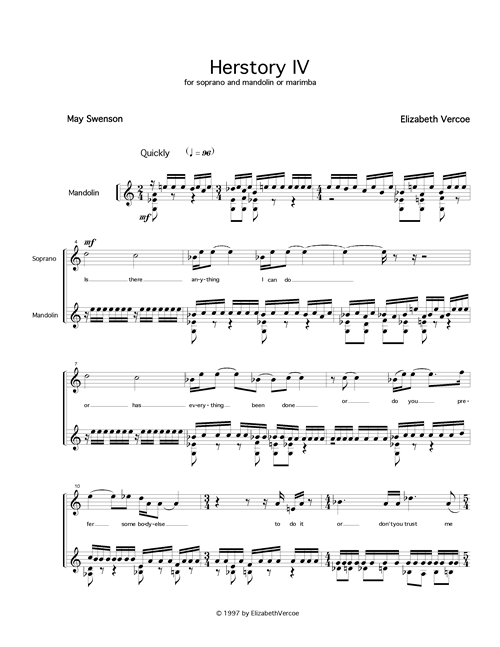Herstory IV
for mezzo or soprano & mandolin or marimba (1997)
Neil Gladd Publications, 12 minutes
Herstory IV performance on YouTube
Written in 1997, Herstory IV is a highly emotional dramatic setting of two related poems by May Swenson, entitled “The Key to Everything” and “All That Time,” for soprano with either mandolin or marimba. The first poem proceeds at a hectic pace and near hysteria with almost no punctuation or capitalization, like a conversation in which the other person has no chance to respond and the speaker never pauses for a breath. In contrast, the second poem is full of imagery and emotion while telling much the same tale of two people tangled in each other’s lives but somehow failing in love. The poems do not proceed in sequence but are intertwined, alternating with each other. The music follows the lead of the poetry, intertwining a hectic music with a much slower and more reflective and more emotive counterpart. In the end the setting of the first text takes on the character and quality of the second in an expressive final section.
The premiere ( with marimba) was given in 2001 on a concert by the Contemporary Music Forum at the Corcoran Gallery in Washington, D.C. In 2002 mandolinist Neil Gladd, for whom the piece was written, and Marjorie Bunday, mezzo soprano, gave the premiere with mandolin, also in the Washington area. Gladd has also performed the piece with soprano Jean Ferraraccio in Tennessee and with mezzo Jennifer Capaldo in Virginia.
Read: Neil Gladd’s article, Mandolin Music by Women
Texts
The Key to Everything & All That Time
by May Swenson
[1.]
Is there anything I can do
or has everything been done
or do
you prefer somebody else to do
it or don’t
you trust me to do
it right or is it hopeless and no one can do
a thing or do
you suppose I don’t
really want to do
it and am just saying that or don’t
you hear me at all or what?
[2.]
I saw two trees embracing.
One leaned on the other
as if to throw her down.
But she was the upright one.
Since their twin youth, maybe she
had been pulling him toward her
all that time,
and finally almost uprooted him.
He was the thin, dry, insecure one,
the most wind-warped, you could see.
[3.]
You’re
waiting for
the right person the doctor or
the nurse the father or
the mother or
the person with the name you keep
mumbling in your sleep
that no one ever heard of there’s no one
named that really
except yourself maybe
If I knew what your
name was I’d
prove it’s your
name spelled backwards or
twisted in some way the one you
keep mumbling but you
won’t tell me your
name or
don’t you know it
yourself that’s it
of course you’ve
forgotten or
never quite knew it or
weren’t willing to believe it
[4.]
And where their tops tangled
it looked like he was crying
on her shoulder.
On the other hand, maybe he
had been trying to weaken her,
break her, or at least
make her bend
over backwards for him
just a little bit.
And all that time
she was standing up to him
the best she could.
She was the most stubborn,
the straightest one, that’s a fact.
But he had been willing
to change himself—
even if it was for the worse—
all that time.
[5.]
Then there is something I
can do I
can find your name for you
that’s the key to everything once you’d
repeat it clearly you’d
come awake you’d
get up and walk knowing where you’re
going where you
came from
And you’d
love me
after that or would you
hate me?
no once you’d
get there you’d
remember and love me
of course I’d
be gone by then I’d
be far away.
—Texts used by permission of the Literary Estate of May Swenson.

